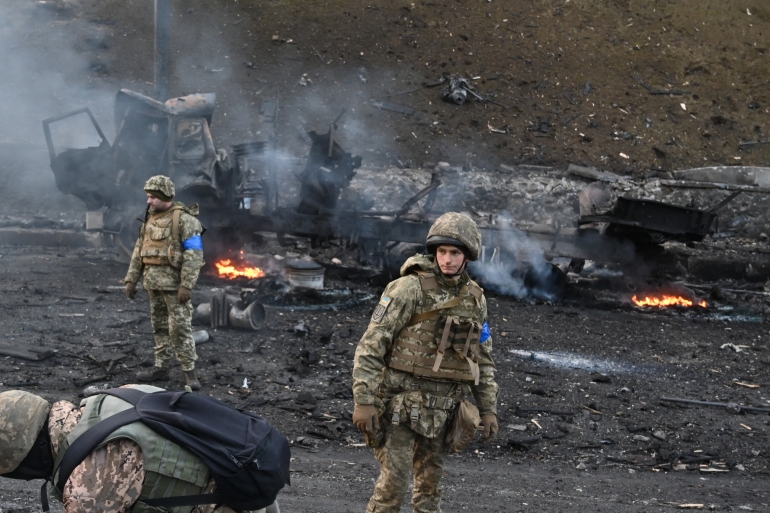
By Tapiwa Gomo RUSSIA’S war on Ukraine is thought to be ushering in a “new world order” by reshaping international relations and globalisation.
During his recent visit to China, Russian Foreign minister Sergey Lavrov hinted the need for a multipolar, just, democratic world order, away from what he described as the world “living through a very serious stage in the history of international relations”.
This should come as refreshing news for African countries that have struggled to rise under the weight of Western hegemony.
Since colonisation of Africa by Europe, it has been difficult to challenge Western hegemony without facing repercussions. African academics have produced acres of literature analysing why the continent was unable to use its natural and human resources to develop its people.
The answer has always been that the United States and Europe have not let go of their control of African countries.
Their control of Africa has taken various normative shapes and tones, yet the shackles on the economy remains intact.
After colonisation, they gave us the concept of independence — an idea of political freedom without economic control which continues to force poor African leaders to bow down to the whims of former colonisers inorder to access funds, ideas and policies on how to run “free” countries.
In the US, after establishing a huge economic base using free African slave labour, they gave them civil rights.
- Chamisa under fire over US$120K donation
- Mavhunga puts DeMbare into Chibuku quarterfinals
- Pension funds bet on Cabora Bassa oilfields
- Councils defy govt fire tender directive
Keep Reading
Even with limited or no access to economic opportunities, our black brothers and sisters celebrated this as victory when it was nothing, but a means of reducing costs.
It was a way by slave masters to abrogate the responsibility of paying welfare bills for their slaves.
It meant black labourers had to use their meagre wages to pay for their welfare. Slave masters’ profits soared.
While the concept of democracy is centuries old, it was in the late 1980s that it gained momentum.
It was a season marked by critical events such as the fall of communism in Eastern Europe, the end of Cold War, the fall of the Berlin Wall, the subsequent dissolution of the Soviet Union and a process of political transformation across Latin America, Africa and Asia.
These events inaugurated a new era in international relations, but most notably they reinforced concentration of global power, via global governance institutions, in the hands of the US and western Europe.
It is US and western Europe that perpetrated slavery and colonisation which they now rebranded as democracy giving themselves the power to prescribe, superintend, supervise, control and reprimand other nations for non-compliance.
Democracy is a nice sounding concept that bears all the promises of a good life for humanity.
It is premised on the ideas of freedom, choice, dignity and rights for all — supposedly giving power to people to choose who governs and how they should be governed. What is there not to like about such a utopia concept? But it is prescribed.
Democracy has been manipulated and contaminated.
It is now used as a tool to bully other nations using civil society organisations and sanctions to incite people against their governments.
In some cases, this has resulted in long drawn wars and deepening destitution.
Anything that threatens their economic interests invites sanctions or war.
The US and western Europe have been involved in dozens of wars across the globe disguised as pursuit of democracy. Yet the real reason is access to economic resources.
Today, an estimated of 10% countries in the world are under some form of US sanctions.
The EU, in most situations align with US foreign policies.
The aim of sanctions is to ensure government compliance with the imposer’s interests and are often viewed as more humane than military intervention.
So instead of a war, the imposer can choose sanctions which is why their impact is the same.
What does this behaviour mean to the state of the world today?
Wars are among the leading causes of human suffering in the world.
At least 82,4 million people around the world have fled their homes due to wars. Among them are nearly 26,4 million refugees.
About one in every 95 people on earth has fled their home as a result of conflict.
In addition, about 50 million people are internally displaced due to conflict.
Wars, disguised as pursuit for democracy, have destroyed economies, essential services, separated families and reversed development gains and intensified severity of poverty.
Meanwhile, recent studies have criticised economic sanctions for not achieving their objective and for having a negative impact on areas such as human rights, democracy, poverty, healthcare and basic living conditions.
US sanctions — targeted or not targeted — have adversely affected the wrong people and have escalated destitution and destroyed economies from which people should derive their economic and political power.
Between 1976 and 2012, sanctions led to at least 30% aggregate decline in gross domestic product per capita of the sanctioned countries.
They have a damaging effect on income inequality and impact ordinary people more than the sanctioned country’s leaders.
They weaken control of local resources by local leadership thus curtailing the ability of nations to extricate themselves from poverty.
In some countries, sanctions have hardened autocratic leadership which uses poverty as a tool to control the population and blame all problems on the sanctions.
The US and western Europe are largely part of the architects of global poverty which is why a new world order is necessary and African countries must take advantage of emerging opportunities.










